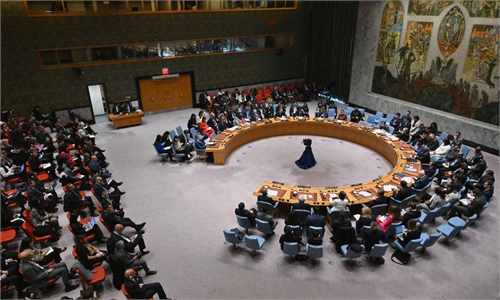
Aiding war. Illustration:Liu Rui/GT
On Sunday, Israel suddenly ended its months-long operation in Khan Younis, withdrawing all troops from southern Gaza and leaving only one brigade in the region to continue operations in other areas. On the same day, Israeli Defense Minister Yoav Gallant said the withdrawal of troops from southern Gaza was to prepare for the coming mission in the Rafah area. Experts believe that such a move from Israel is only a temporary compromise under internal and external pressure and does not mean the end of the current round of the Palestine-Israel conflict. Instead, it rather indicates that the conflict will drag on.
Currently, Israel is facing heavy pressure. With US' indulgence, the country has repeatedly ignored UN's ceasefire resolutions. Recently, seven aid workers from the non-profit World Central Kitchen tragically died in an Israeli strike, once again igniting the anger of the international community. At the same time, protests against the government are continuing to escalate in Israel. A Chinese military expert told the Global Times that in addition to the pressure from the US and domestically, Israel also needs to worry about retaliation from Iran. On the other hand, it is likely to have realized that it is impossible to completely eradicate Hamas in Gaza, and this withdrawal may also be a strategic move.
According to Egyptian media, an anonymous senior official from the Egyptian security department stated that "significant progress" has been made in the ceasefire negotiations in Gaza being held in Cairo, Egypt. However, Niu Xinchun, executive director of the China-Arab Research Institute of Ningxia University, believes it is still difficult to judge the prospects of the talks. Israel and Hamas have repeatedly failed to reach agreements on fundamental issues, such as whether the war can be completely ended and whether civilians can return to northern Gaza.
Under increasing pressure, US President Joe Biden finally issued a final ultimatum to Israel: He urged Israeli Prime Minister Benjamin Netanyahu to act immediately to protect Palestinian civilians or face "changes in the US' policy." Biden's appeal comes as domestic pressure mounts in the US. Due to Washington's support for Israel, Biden faces increasing anger from Muslims and young voters, as well as pressure from his allies. This is the catalyst for Biden's tough calls on Israel.
But Israel has always responded indifferently to pressure from the US. Niu told the Global Times that the obvious effect of the pressure exerted by the US on Israel can hardly be observed, which is due to the fact that fundamentally, the interests of the US and Israel are aligned in many areas, such as eliminating Hamas and combating Iran. Washington's pressure is just to appease domestic and international opposition.
It is because of the US' excessive bias that the humanitarian crisis has been created in Gaza. Verbally, the US has long claimed to support the two-state solution, but it keeps developing an increasingly close relationship with Israel. The US' blatant bias toward Israel has made Middle Eastern countries realize that Washington is not trying to solve the fundamental problems in the region but rather help Israel out of trouble. This has caused the US to lose more and more influence over the situation in the Middle East.
The Gaza conflict has been going on for six months. The severe humanitarian crisis in the region has left Israel more isolated than ever since modern times. The international community continues to call for a ceasefire in Gaza, the release of hostages, and the implementation of large-scale, sustained humanitarian relief efforts. Even in the West, the moral balance no longer tilts toward Israel.
And it is not only Israel that faces isolation, but also the US that has long made supporting Israel a "long-term national policy." Despite the warnings to Israel, Washington continues to provide military assistance - this double standard is even unbearable for some US officials: two US State Department officials have resigned since the outbreak of the Palestine-Israel conflict. On the international level, the US' position against an immediate ceasefire in Gaza has been repeatedly criticized by the international community. As a result, the US can hardly avoid its fate of being isolated further by the world over this matter with its bias toward Israel carrying on.
Niu believes that although almost all Israeli troops have been withdrawn from southern Gaza, small-scale sporadic conflict will continue to break out in the Gaza area for a long time. It may still be a long way off for Israel and Palestine to completely end the conflict and achieve a ceasefire. At such a critical juncture, continuing to favor one side and engaging in the use of force and arms transfers will not help solve the problem but will only muddle and complicate the situation. Only by comprehensively, fairly, and sustainably resolving the Palestinian issue can the Middle East truly achieve lasting peace and universal security.

